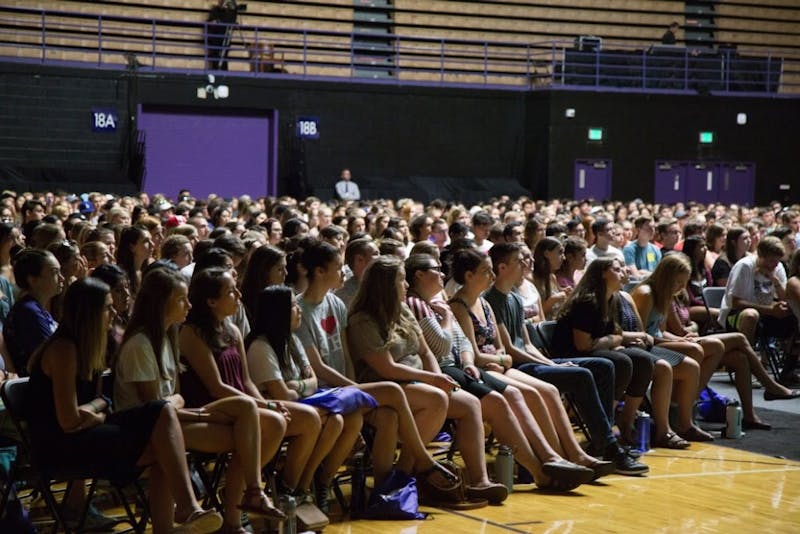The Chiles Center was packed last Friday as incoming freshmen sat in rows and awaited the annual Green Dot presentation.
But this time, something was different.
For the past several years, all students on campus have learned about the Green Dot project: an effort to increase safety on campus by teaching students methods to interfere in potentially violent situations.
However, this was the first year that the Green Dot presentation was preceded by a presentation highlighting the importance of consent and delving into the issue of sexual assault.
The presentation was given by juniors Abby Sherman and Katie Reinig, and sophomore Erik Wingfield, who are the co-founders of a new club on campus called Students Against Sexual Assault (SASA).
At the University of Portland, where the Catholic identity sometimes makes sex a touchy subject, this club will be the first to directly target the issue of sexual assault on campus.
The founders of SASA explained to the newest class of Pilots that, based on national statistics, one in five women and one in 16 men will be sexually assaulted by the time they leave college. They shared the University’s definition of consent: “freely and voluntarily given mutual agreement understood by both parties, and communicated by clearly understandable words or actions,” and highlighted the importance of consent in student relationships.

“In these next four years, you all get to choose your own forms and levels of intimacy,” Wingfield said. “It is important to keep in mind that it is, in fact, your own choice to make. It is your choice to engage, or not engage, in anything. By understanding the need for consent, we are creating an ongoing dialogue that keeps our relationships and our campus community safe. And we Pilots have to stick together.”
The conversation started at the freshman orientation will continue through SASA, whose mission is to advocate against and bring an end to sexual assault on college campuses. They also hope to address rape culture on UP’s campus and the stigma placed on victims of sexual assault.
Ultimately, the three founders hope to get people more comfortable talking about sex and healthy sexual relationships.
“We’re all very passionate about this,” Sherman said. “This club is a great merging of hearts.”
While Sherman, Reinig and Wingfield share a similar passion of ending sexual assault, each founder brings a different perspective of why the club is needed at UP.
Reinig, a junior biology major and Health Center peer advisor, approached the Health Center asking if she could have some time at freshman orientation to talk about consent and sexual assault rates, a topic she didn’t recall being covered at her own freshman orientation. She received positive responses from advisors and administration.
“I don’t know a person that (sexual assault) hasn’t affected,” Reinig said. “Everybody knows somebody that sexual assault has happened to….When we were freshmen, I don’t remember getting a talk about this. What we did today was open the conversation.”
Sherman, a junior organizational communication major, had always been passionate about the topic, but became further aware of sexual assault statistics through her Argumentation and Advocacy class last year.
“It’s affected every woman in my life,” Sherman said. “Having that be such a big issue and being exposed to it so very young, I have always had a passion for it. My inner advocate couldn’t be silent any longer. It couldn’t just be Facebook posts and rants on Twitter, I decided to do something about it.”
Reinig approached Sherman for help at the freshman orientation consent presentation. Sherman furthered Reinig’s idea by bringing up the idea of SASA.
“Katie asked me if I wanted to do this consent presentation with her and I was like, ‘Funny you mentioned, do you want to start a club with me?’” Sherman said.
Wingfield, a sophomore business major and a member of the Men’s Cross Country team, wanted to bring a male athlete perspective to the issue of sexual assault.
“From a male perspective, too, (sexual assault) has been really popular in big fraternities and sports teams,” Wingfield said. “As an athlete, a lot of attention has been drawn. It’s almost a male stigma that (sexual assault) can’t be talked about. Victim blaming occurs. There’s so many angles that it comes from, and there’s not one source. I think it’s important to begin the conversation.”
Margaret Trout, director of the Health Center and Dr. Bohn Lattin, a communication studies professor, will be the club’s advisers. SASA is currently awaiting official approval, after which point they will determine meeting times.
The club will have a booth at the Activities Fair in the Chiles Center on Sept. 2.

Until further work from the club, freshmen are left to contemplate the ideas and facts presented by SASA’s first presentation.
“There are many things within our culture that need to change in order to bring an end to sexual assault on college campuses,” Sherman told the freshmen Friday. “Today, here and right now, we’re going to start that change. So let’s talk about it.”
Said freshman Liah McGehee: “The presentation made you think. It’s not really talked about that often, and I think it’s cool that the University makes an effort to get people educated about the topic. I actually talked to my roommates about sexual assault rates after and put the magnet they gave me on the fridge. It was really effective.”








